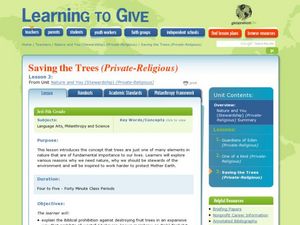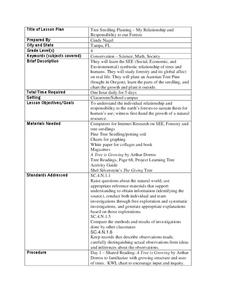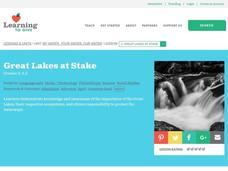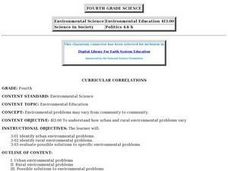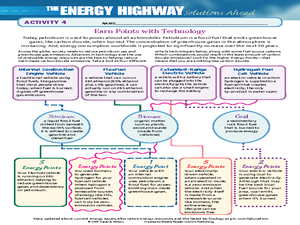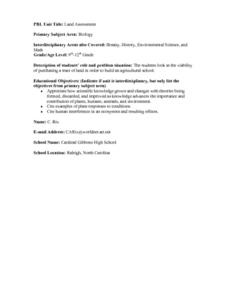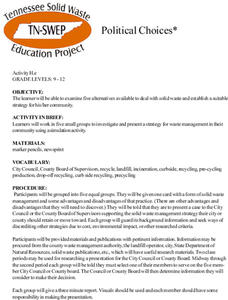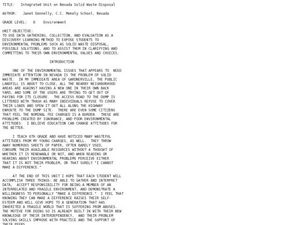Curated OER
Saving the Trees
Students identify why trees are important. In this environmental lesson, students read the book The Giving Tree and list reasons why humans need trees. Students create a storybook to explain why other natural resources are important to...
Curated OER
Leaf Stomata as Bioindicators of Environmental Change
Students, in this experiment, collect leaves from two species of trees and the stomatal index on the upper and lower epidermis of each leaf be determined.
Curated OER
Tree Seedling Planting- My Relationship and Responsibility to our Forests
In this trees lesson, 4th graders read the book, A Tree is Growing and complete a KWL chart on how trees grow and how they are used. Students research the symbiotic relationship of humans and trees, create tree collages, plant a...
Curated OER
Great Lakes at Stake
Students explore conservation of the Great Lakes. In this geography and ecology lesson, students identify the Great Lakes on a map and view a video depicting the history and importance of these lakes. Students work in groups to research...
Teacher Created Resources
Problem and Solution: By Jove, I Think You've Got It
Through grand conversation, help scholars identify issues that harm the Earth and find solutions on how to solve them. After voting—on what your class deems the most important problem—stretch writing muscles with a problem-solution...
Curated OER
Environmental Education -- Communities
Fourth graders identify urban and rural environmental problems. They work together to develop possible solutions. They ask questions to end the lesson.
Curated OER
Environmental Education (Grade 4)
Fourth graders examine environmental concerns that affect their community. They work together to develop possible solutions and share them with the class. They ask questions to end the lesson.
Curated OER
Colonial Settlement and Environmental Problems
Students work together to develop a chart showing the relationship between the settlement of the United States and environmental problems. Using this information, they identify the human activities responsible for damaging the...
Curated OER
We Are All Responsible
Pupils conduct research about the issue of conservation and the environment. They focus upon the interdependence of man and nature. They write and discuss the issue of environmental preservation. Students appreciate the importance of...
Curated OER
Natural Hazards Research Paper and Oral Presenation
High schoolers use the internet and look at a list of the world's countries and the natural hazards that impact them. They comprehend that it is sometimes called "Nature's Fury," each natural hazard has a heartbeat, a locational pattern,...
Curated OER
Environmental Destruction in Vietnam
Students watch video clip on Environmental Destruction of Vietnam, select and discuss passages from essay, Resuscitation of the Dead Earth, that emphasize destruction to the land, and write essay on whether United States should have been...
Curated OER
Environmental Education/Water Pollution
Fifth graders play a game in which they list as many environmental issues or terms in alphabetical order. They brainstorm ways they can save the environment and create a mural that displayed research found from the internet and Encarta.
Curated OER
"Environmental Activism and its Components"
Students explore how an individual has power and voice in all levels of the government as well as in the making of laws that involve environmental issues and regulations. They assess the steps involved in turning a bill into law. In...
Curated OER
When Electronics Are No Longer Useful to Us: Disposing Responsibly
Students discover ways to recycle electronics. Through discussion and research, they identify ways in which electronics that are improperly disposed can be harmful to the environment. Students explore how to responsibly dispose of...
Curated OER
Lead and Children: Toxic Exposure!
Students access the Thinkport website to read, synthesize, and summarize information regarding lead poisoning. They write brief constructed responses to a research guide concerning lead poisoning.
Curated OER
Earn Points with Technology
Students explore renewable energy by analyzing a diagram. In this fossil fuel lesson plan, students view a chart explaining the different energy consumption from automobiles and how they impact our environment. Students analyze a point...
Curated OER
Land Assessment
Students work in small groups on a problem based learning activity. Students are presented with a problem of buying land to use for educational purposes only and must determine if it is feasible to buy it based on soil analysis and plant...
Curated OER
Political Choices
Students, in small groups, investigate and present a strategy for waste management in their community using a simulation activity in which each group represents a sector of their community.
Curated OER
Integrated Unit on Nevada Solid Waste Disposal
Sixth graders examine how to gather and interpret data, accept responsibility for the environment, and demonstrate an interest in making a difference in this series of lessons.
Curated OER
Designing an Ecologically Sound City
Fifth graders design an "ecologically sound" city. They write laws for the city to help make all citizens aware of their ecological responsibilities and propose alternative power sources for light and heat.
Curated OER
Hoot: List-Group-Label
Word association is a great way to explore vocabulary and new ideas. In a unit about Carl Hiassen's Hoot, kids think about the word environmentalist and come up with additional words that they associate with environmentalism on...
Curated OER
Organic Mechanic Part I
On day one of the "Organic Mechanic Part I" instructional activity, learners try to remove the waxy coating of an apple and consider pesticides that may be represented by this addition to our food. On day two, they research pesticides...
Curated OER
Our Environment
Students examine the world's environmental dilemmas and create project depicting how to improve the environment. They study ten endangered species.
Curated OER
Quote Poker
Students work in small groups in order to find environmental quotes. The quotes are passed around and they decide which one is liked the most. Then students read the quote out loud to the class and explain the reasons for picking the quote.
